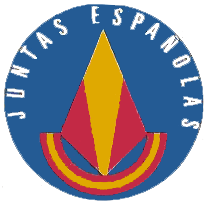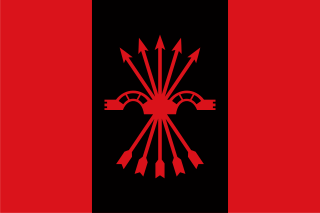The Batallón Vasco Español (BVE) sometimes associated with the Alianza Anticomunista (AAA), Antiterrorismo ETA or Triple A was a Spanish neo-fascist parapolice organization present mainly in the Basque Country and Southern France. It began operations in 1975, a year and a half after the murder of Luis Carrero Blanco by ETA and disbanded by April 1981. Some of its former members joined an organization formed not long after, known as the Grupos Antiterroristas de Liberación. The use of violence by the BVE was reported by ETA and its allies, who identified it as violence committed directly by the Spanish government against the Basque population. Manuel Fraga, former interior minister who was in office when the BVE was formed, defended it by saying it was a group of mayors who self-defended because ETA was going after them but had no influence in the course of the events.

Young Force was the youth wing of Fuerza Nueva, the Spanish far-right nationalist party founded in 1966.

The People's Alliance was a post-Francoist electoral coalition, and later a conservative political party in Spain, founded in 1976 as a federation of political associations. Transformed into a party in 1977 and led by Manuel Fraga, it became the main conservative party in Spain. It was refounded as the People's Party in 1989.

Juntas Españolas was a far-right political party in Spain that was created in 1983 after a call had been issued in the now-defunct newspaper El Alcázar by the newspaper's director, Antonio Izquierdo. The group also followed the failure and self-dissolution of the Fuerza Nueva of Blas Piñar.

Josep Anglada Rius is a Spanish far-right politician from Catalonia. He began his political career in the Spanish nationalist, ultra-Catholic, Francoist-leaning party Fuerza Nueva, effectively assuming the role of Blas Piñar's foremost representative in Catalonia, and is the founder and long-standing president of the party Platform for Catalonia. He was leader of the party till 2014 when he was expelled for "management deficiency".

The Maoist Youth Union was a youth organization in Spain during the transition to democracy. It was founded as the youth wing of the Workers Revolutionary Organization (ORT) in 1975.
Far-right terrorism in Spain surged after the death of dictator Francisco Franco in 1975 and continued until the early 1980s. The term refers to the actions undertaken by fascist and far-right groups who were against the changes taking place during the transition to democracy, and essentially dedicated to street violence against persons of other ideologies.
Spanish Alternative is a far-right political party in Spain. It describes itself as "social Christian and cross-sectional". Its Secretary General is the lawyer and businessman Rafael López-Diéguez, former member of the far-right New Force, active formation during the Transition and managed by his father-in-law, the historic leader Blas Piñar, who was named honorary president of AES, a post which he held until his death in January 2014.

Falange Española de las JONS is a Spanish political party registered in 1976, originating from a faction of the previous Falange Española Tradicionalista y de las Juntas de Ofensiva Nacional Sindicalista. The word Falange is Spanish for phalanx. Members of the party are called Falangists. The main ideological bases of the party are national syndicalism, Third Position and ultranationalism.

Falange Española Independiente was a Spanish political party registered in 1977, originating from the Frente de Estudiantes Sindicalistas (FES), a student group of anti-Francoist falangists.
Xavier Casals Meseguer is a Spanish historian specialized in the field of the far-right.

La Correspondencia Militar, also known as La Correspondencia, was a daily newspaper published in Madrid from 1877 to 1932. During its existence it maintained a hawkish editorial line favorable to the Spanish Army.

Eduardo González Calleja is a Spanish historian, professor of Contemporary History at the Charles III University of Madrid (UC3M). He is the author of a long list of scholar works dealing with political violence.
Gonzalo Álvarez Chillida is a Spanish historian. He has been referred to as the leading Spanish expert in the study of antisemitism in Spain.

Fernando José "Ferran" Gallego Margaleff is a Spanish historian and writer.
The history of the far-right in Spain dates back to at least the 1800s and refers to any manifestation of far-right politics in Spain. Individuals and organizations associated with the far-right in Spain often employ reactionary traditionalism, religious fundamentalism, corporate Catholicism, and fascism in their ideological practice. In the case of Spain, according to historian Pedro Carlos González Cuevas, the predominance of Catholicism played an essential role in the suppression of external political innovations such as Social Darwinism, positivism, and vitalism in Spanish far-right politics.

The equestrian statue of Francisco Franco was an instance of public art in Madrid, Spain. The statue, depicting dictator Francisco Franco riding a horse, was removed from its location in Nuevos Ministerios and subsequently stored in March 2005.
The so-called comedia madrileña or nueva comedia madrileña was a film trend or film label for urban comedies in Spain that emerged during the Transition. It was led by filmmakers such as Fernando Colomo and Fernando Trueba.

Orthodox Peronism, Peronist Orthodoxy,National Justicialism, or right-wing peronism for some specialists, is a faction within Peronism, a political movement in Argentina that adheres to the ideology and legacy of Juan Perón. Orthodox Peronists are staunch supporters of Perón and his original policies, and they reject any association with Marxism or any other left-wing ideologies. Some of them are aligned with far-right elements. Orthodox Peronism also refers to the Peronist trade union faction that split from the “62 organizations" and that opposed the “legalists", who were more moderate and pragmatic. They were also known as “the hardliners", “the 62 standing with Perón" and they maintained an orthodox and verticalist stance, in accordance with the Peronist doctrine. Orthodox Peronism has been in several conflicts with the Tendencia Revolucionaria, for example during the Ezeiza massacre.

José Bondía Román is a Spanish trade unionist who led the National Confederation of Labour (CNT) as its General Secretary from 1979 to 1983. A leading advocate of participation in union elections to works councils, he led a faction of the CNT that formed part of the General Confederation of Labour (CGT).












